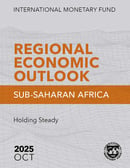This web page provides information on the activities of the Office, views of the IMF staff, and the relations between Benin and the IMF. Additional information can be found on Benin and IMF country page, including official IMF reports and Executive Board documents in English and French that deal with Benin.
At a Glance
- Benin joined the Fund on July 10, 1963.
- Total Quotas: SDR 123.8 Million
- Loans outstanding: ECF Arrangements SDR 109,29 Million
- Last Article IV Consultation: The 2019 Article IV Consultation staff report was discussed by the Executive Board on June 21, 2019. (IMF Country Report No. 19/203, July 2, 2019)
Fraudulent Scam Emails
For more information please see Fraudulent Scam Emails Using the Name of the IMF.
IMF's Work on Benin
No results found. Either there was an error with the web service or there is no data returned by the web service.
Office Activities
Press Conference at the End of the Fourth Review and the 2019 Article IV Consultation Mission (français)
Video in French
May 14, 2019
Interview with ORTF (Beninese Television)
This interview with the resident representative aimed to present the key messages of the 2018 fall REO, discuss Benin’s recent economic development and highlight the IMF role on building capacity through TA and external training to reach out to more people.
November 30, 2018
May 28, 2018
Third Edition of the “Open House Day” for Students and Academia, Bénin Révélé Magazine
Article in French - The objective of this event was to to present what the Fund does in general and in Benin with emphasis on the IMF’s capacity development work
February 28, 2018
Déclaration du Chef de mission du FMI pour le Bénin
September 27, 2017
Regional Economic Outlook
October 16, 2025

The outlook for Sub-Saharan Africa is showing resilience, despite a challenging external environment with uneven prospects in commodity prices, still tight borrowing conditions, and a deterioration of the global trade and aid landscape.
Read the Report
Departmental Papers on Africa
 The Departmental African Paper Series covers research on sub-Saharan Africa conducted by International Monetary Fund (IMF) staff, particularly on issues of broad regional or cross-country interest. The views expressed in these papers are those of the author(s) and do not necessarily represent the views of the IMF, its Executive Board, or IMF Management.
The Departmental African Paper Series covers research on sub-Saharan Africa conducted by International Monetary Fund (IMF) staff, particularly on issues of broad regional or cross-country interest. The views expressed in these papers are those of the author(s) and do not necessarily represent the views of the IMF, its Executive Board, or IMF Management.



